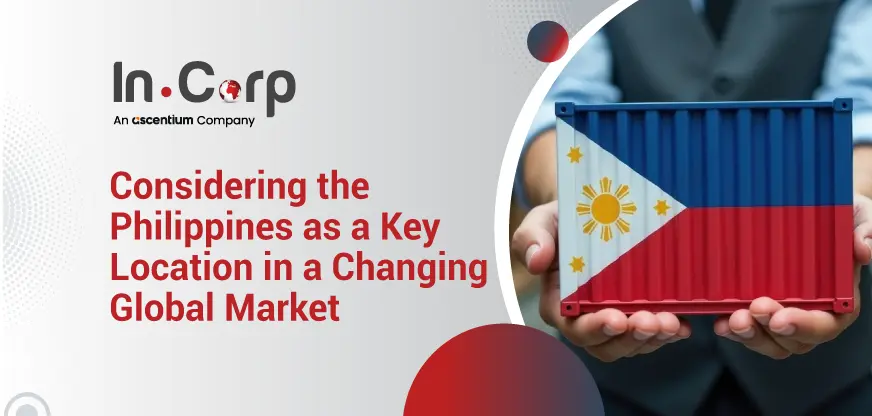
Considering the Philippines as a Key Location in a Changing Global Market
The Philippines, strategically located in Southeast Asia, plays a vital role in global trade with its access to major markets and advanced port infrastructure. Its position and policies make it a prime choice for businesses navigating today’s supply chains.
- Overview of Developments in US-China Trade Tariffs
- The Philippines as an Investment Alternative Hub
- What are the Benefits of Investing in Philippine Export-Oriented Enterprises?
- What are the Tax Incentives For Export Enterprises?
- How to Invest and Register a Company in the Philippines
- Frequently Asked Questions
Overview of Developments in US-China Trade Tariffs
Recent developments in trade policies between the United States and China have resulted in significant tariffs. The US introduced a 145% tariff on specific goods from China, while China implemented a 125% tariff on selected US goods. These measures largely stem from longstanding trade imbalances and strategic economic interests.
Certain industries are experiencing challenges, including higher consumer costs linked to tariff-related changes. Sectors such as electronics, semiconductors, assembly operations, textiles, and agriculture are notably impacted, and to address these dynamics, some multinational companies are exploring options to diversify their manufacturing locations beyond China, aiming to adapt to evolving trade policies.
The Philippines as an Investment Alternative Hub
The Philippines is among the countries that are being considered by companies seeking to diversify manufacturing operations and manage tariff exposure. With a growing manufacturing base and ongoing government efforts to streamline business processes, the country presents potential for investment, particularly in export-oriented enterprises.
Focus sectors that would greatly benefit from investing in the Philippines include electronics, semiconductors, textiles, and basic assembly operations—industries where the Philippines already has some capability in manufacturing and exporting.
What are the Benefits of Investing in Philippine Export-Oriented Enterprises
The Philippines offers plenty of investment opportunities, specifically in manufacturing. Investors may want to take advantage of several benefits, such as:
- Experience in manufacturing and exporting of electronics, garments, and processed foods;
- Abundance of agricultural products such as bananas, pineapples, and coconut products;
- Developed logistics and services hub through business process outsourcing (BPO) and IT services;
- Low labor cost but with high quality service; and
- Efficient export zones with plenty of tax incentives.
What are the Tax Incentives of Export Enterprises
Companies registered with the Philippine Board of Investments (BOI) or the Philippine Economic Zone Authority (PEZA) may be eligible for various fiscal and non-fiscal incentives. These include:
- Income Tax Holiday from four to seven years, depending on the location, industry, and classification of the project;
- 5% Special Corporate Income Tax on Gross Income or Enhanced Deduction after lapse of ITH;
- 0% VAT;
- Duty-Free Importation of capital equipment, raw materials spare parts, or accessories; and
- Exemption from Local Business Taxes.
How to Invest and Register a Company in the Philippines
Investors who want to relocate their manufacturing may want to register their business in the Philippines. To start the process, it is essential to understand the types of business vehicles available in the Philippines. Entrepreneurs can choose from options such as sole proprietorships, partnerships, corporations, and even foreign-owned branch offices or representative offices, depending on their business model and needs. Each type comes with its own regulations, benefits, and requirements, so selecting the most suitable one is a critical decision.
The procedure for registration involves several steps, including obtaining the necessary permits, registering with the Securities and Exchange Commission (SEC) or Department of Trade and Industry (DTI), and securing a business permit from the local government unit where operations will take place.
Unlocking Growth Opportunities in the Philippines
The Philippines is well-positioned as a strategic hub in the evolving global trade landscape. Its prime location, advanced infrastructure, and pro-business policies create vast opportunities for industries seeking growth.
With strong manufacturing capabilities and attractive tax incentives, the country equips businesses to establish resilient, competitive supply chains. For companies exploring new markets, the Philippines offers not just an alternative but a strategic edge for long-term success.
For comprehensive guidance on investing or setting up a business in the Philippines, you may reach out to experienced business consulting firms to ensure a smooth and informed process.
Allow Us To Help You Invest and Set-Up Your Business in the Philippines
Frequently Asked Questions
Why is the Philippines considered a strategic location for global trade?
The Philippines, strategically located in Southeast Asia, offers direct access to major markets. With advanced ports, proximity to global shipping routes, and investment-friendly policies, it’s an ideal trade and logistics hub for businesses.
What industries stand to benefit the most by relocating to the Philippines?
The Philippines supports industries like electronics, semiconductors, textiles, agriculture, and assembly, leveraging strong manufacturing capacity, export expertise, infrastructure, and government incentives.
Why are companies considering the Philippines as an alternative investment hub?
The Philippines offers several advantages, including a growing manufacturing sector, low labor costs, and robust export-oriented industries such as electronics and textiles. The government has also streamlined processes to attract foreign investment. These factors make the country an appealing choice for businesses looking to mitigate tariff risks and diversify their supply chains


